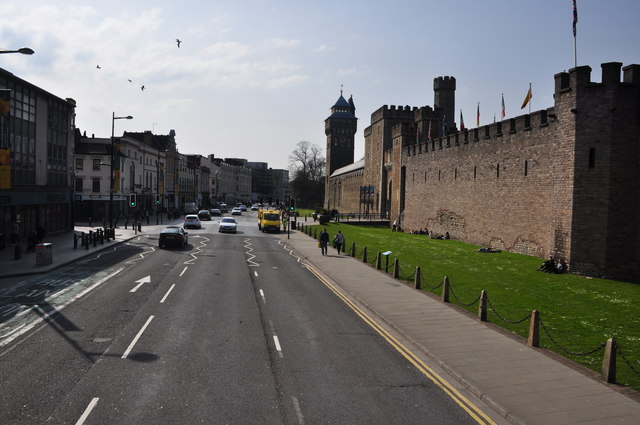MOTORISTS in Cardiff were slightly inconvenienced this week, when Castle Street was closed to traffic for three days by a boat painted bright green, placed there by a number of demonstrators with similarly-coloured political views, and – in many cases – hair.
Protesting under the banner of Extinction Rebellion (XR), the Cardiff demonstration was part of XR’s ‘summer uprising’; a series of protests in cities around the UK. XR made a spectacular entry onto the political stage in April this year, when its demonstrations brought much of central London to a standstill and resulted in more than a thousand arrests. The actor Emma Thompson took XR’s message of climate emergency so seriously that she flew five thousand miles in first class, just to be there.
XR only came into being a year or so ago; initially formed of a disparate rag-tag of the usual anarchist suspects. Previously, its founders had participated in the Occupy movement, and run an obscure fringe anti-capitalist group called ‘Rising Up!’
Its ideological leaders are Julian Roger Hallam, once a very unsuccessful two-organic-goats type smallholder in the Carmarthenshire village of Gelli Aur, who claims to have been persuaded towards eco-activism when extraordinary weather events –rain, possibly– spoiled his crop. Hallam makes no secret of his political ambitions for the movement: “We are going to force the governments to act. And if they don’t, we will bring them down and create a democracy fit for purpose… and yes, some may die in the process.”
His colleague Gail Bradbrook’s inspiration to become a full-time activist was less meteorological and more pharmaceutical. On a trip to Costa Rica –be fair, perhaps she walked there– the ‘neo-pagan’ took mind-bending quantities of ayahuasca (a potion brewed up by shamans in the Amazon jungle) and the psychoactive shrub iboga. This experience, Bradbrook relates, ‘rewired’ her brain and gave her ‘the codes of social change’. Soon after, she left a no doubt relieved husband and began her vital work to save the planet.
XR’s demands on the Government are not modest: a halt to extinctions, the establishment of citizens’ assemblies, and the total decarbonisation of the UK economy by 2025. To achieve this latter goal, there would need to be a total ban on commercial aviation, 38 million cars sent to the scrapyard and gas boilers removed from 26 million homes.
To bring this utopia about, XR advocates an economic model of ‘de-growth’; or what conventional economists would more baldly term permanent recession. They see economic resources on the planet as finite, and –despite the experience of European economies that increased prosperity leads to population reduction, and that technological advance leads to a cleaner environment– believe that only mass impoverishment can save the Earth.
In any democratic system, that ain’t going to happen. People will never vote to make themselves that much poorer.
This may be why XR’s founders have little confidence in achieving their political objectives by traditional means. Democratic politics don’t work for them. Roger Hallam stood as an independent candidate in London in the recent European Parliament election, sweeping up a miserable 0.04% of the vote and making even ChangeUK look wildly popular.
The people behind XR are cranks and dangerous cranks at that. XR’s great success is in hiding the cranks behind the banner of a cause that has real merit and dressing up the old anti-capitalist movement in green clothes. Alongside the predictable anarchists, hippies and conspiracy theorists, XR gets on board a load of yummy mummies for whom a more typical act of environmental activism is buying something from Waitrose with a butterfly on the label.
Previous anti-capitalist activism has always looked a bit too lairy for the middle classes. It was also ineffective. The police developed effective crowd control responses to disorder like the May Day riots of 2000 and 2001; the tactic of ‘kettling’ demonstrators, making them seriously uncomfortable for a while, then letting them go in dribs and drabs while ensuring obvious organisers get nicked, effectively put a lid on the more riotous kind of demonstration for years.
By contrast, XR have done a good job of keeping the scumbags at arm’s length and putting a friendly, non-violent middle-class face on their protests. They are promoting just as hard a political agenda, more effectively, without – for the time being – smashing shop windows. Their organisers recognise that people aren’t hugely enthusiastic about the central message of ‘smash the system’ but might be prepared to engage in a little light system-smashing if they see themselves as heroes saving the planet in the process.
Compared to April’s traffic meltdown in London, the Cardiff demo was small potatoes. Cardiff isn’t a huge place and Castle St is easily bypassed. As usual with such protests, any economic damage it caused was felt most by low-wage workers –taxi drivers; tradesmen trying to get to a job – rather than the big corporations it affected to target.
Climate change is real, and the Government are doing something about it. Effective pressure groups are a necessary part of any democratic system, but ultimately so is respect for the system itself, and for the rule of law.
XR’s founders don’t respect our system of democracy and want to destroy it. That isn’t in the interest of any of the middle-class people who now offer XR their uncritical support. It is to be hoped that a few of those thousand who were arrested in London get to experience the ghastly mortification of being frogmarched to a holding cell at JFK and summarily repatriated, next time they attempt to pop over to New York for the weekend.
Extinction Rebellion’s anti-capitalist manifesto represents exactly the wrong way to fight climate change. Economic growth, not a neverending recession, will develop renewable, clean technologies that allow people to live in prosperity without harming the environment. If they really want to make a difference, rather than sitting down in front of Cardiff Castle XR should go and sit down in Tiananmen Square, and tell that country’s government to take climate change seriously.



















Add Comment